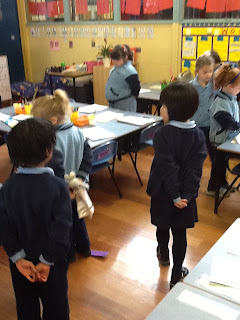Empowering Our Youngest Writers
In recent days, I have spent a considerable amount of time in classrooms along side our youngest writers. I have worked with teachers of these emerging writers and in every instance these educators are striving to provide opportunities for their students to develop a healthy perception of themselves as writers. Daily opportunities to write on topics and ideas selected by the students themselves have been a feature. Encouragement for students to experiment with sounds and letters as they develop increasing confidence to composing meaningful messages for others to read. These young authors are developing important understandings about what it means to write. They are also being consistently supported to learn useful strategies to guide them in the processes of writing. Gradually they are forming a sense of form and genre and craft through their writing experiences. They are also experimenting with writing conventions. I witnessed powerful evidentce of students' reading the room' as they searched for conventional spelling of sought after words. Word walls were constantly scanned. Writers collaborated. A creative buzz filled these classrooms.
They are gradually becoming 'brave writers' who are willing to take risks with the spelling of previously unfamiliar words. Teachers are conscious of encouraging their students to make decisions about the shape and form of their writing. They are mindfully teaching, rather than trying to control writing.
As students engage with language and progressively gain control of the words they wish to use, the teacher is provided with powerful feedback as to the effectiveness of the teaching taking place.
Only yesterday, a teacher shared with me various writing samples she had gathered from one of her young writers. A smile spread across her face as she pointed to the obvious development of the writing between February and June. This was a celebration of the writer's progress.
Teachers are devoting an increasing amount of writing workshop time to rehearsal for writing. A range of pre-writing strategies are implemented to assist the young writer to more confidently identify the message they wish to convey to their readers. Before the writing begins, time is provided for talk, planning, rehearsing, questioning, reading, drawing and so on. The writing that emerges, is enhanced through time devoted to articulating writing intentions. No 'cold starts' for these inexperienced writers. The writer is accorded respect. By the end of their first year of school, the young writers in these classes will move onto Grade one with a healthy image of themselves as writers.
Here are some photographs I took, exemplifying a number of the effective practice I have seen lately.
It's always great to share good news!
They are gradually becoming 'brave writers' who are willing to take risks with the spelling of previously unfamiliar words. Teachers are conscious of encouraging their students to make decisions about the shape and form of their writing. They are mindfully teaching, rather than trying to control writing.
As students engage with language and progressively gain control of the words they wish to use, the teacher is provided with powerful feedback as to the effectiveness of the teaching taking place.
Only yesterday, a teacher shared with me various writing samples she had gathered from one of her young writers. A smile spread across her face as she pointed to the obvious development of the writing between February and June. This was a celebration of the writer's progress.
Teachers are devoting an increasing amount of writing workshop time to rehearsal for writing. A range of pre-writing strategies are implemented to assist the young writer to more confidently identify the message they wish to convey to their readers. Before the writing begins, time is provided for talk, planning, rehearsing, questioning, reading, drawing and so on. The writing that emerges, is enhanced through time devoted to articulating writing intentions. No 'cold starts' for these inexperienced writers. The writer is accorded respect. By the end of their first year of school, the young writers in these classes will move onto Grade one with a healthy image of themselves as writers.
Here are some photographs I took, exemplifying a number of the effective practice I have seen lately.
It's always great to share good news!








Comments
Post a Comment